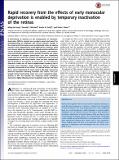| dc.contributor.author | Mitchell, Donald E. | |
| dc.contributor.author | Duffy, Kevin R. | |
| dc.contributor.author | Fong, Ming-fai | |
| dc.contributor.author | Bear, Mark | |
| dc.date.accessioned | 2017-09-13T16:56:21Z | |
| dc.date.available | 2017-09-13T16:56:21Z | |
| dc.date.issued | 2016-11 | |
| dc.date.submitted | 2016-08 | |
| dc.identifier.issn | 0027-8424 | |
| dc.identifier.issn | 1091-6490 | |
| dc.identifier.uri | http://hdl.handle.net/1721.1/111196 | |
| dc.description.abstract | A half-century of research on the consequences of monocular deprivation (MD) in animals has revealed a great deal about the pathophysiology of amblyopia. MD initiates synaptic changes in the visual cortex that reduce acuity and binocular vision by causing neurons to lose responsiveness to the deprived eye. However, much less is known about how deprivation-induced synaptic modifications can be reversed to restore normal visual function. One theoretically motivated hypothesis is that a period of inactivity can reduce the threshold for synaptic potentiation such that subsequent visual experience promotes synaptic strengthening and increased responsiveness in the visual cortex. Here we have reduced this idea to practice in two species. In young mice, we show that the otherwise stable loss of cortical responsiveness caused by MD is reversed when binocular visual experience follows temporary anesthetic inactivation of the retinas. In 3-mo-old kittens, we show that a severe impairment of visual acuity is also fully reversed by binocular experience following treatment and, further, that prolonged retinal inactivation alone can erase anatomical consequences of MD. We conclude that temporary retinal inactivation represents a highly efficacious means to promote recovery of function. | en_US |
| dc.description.sponsorship | National Eye Institute (Grant 5R01EYO23037-03) | en_US |
| dc.language.iso | en_US | |
| dc.publisher | National Academy of Sciences (U.S.) | en_US |
| dc.relation.isversionof | http://dx.doi.org/10.1073/pnas.1613279113 | en_US |
| dc.rights | Article is made available in accordance with the publisher's policy and may be subject to US copyright law. Please refer to the publisher's site for terms of use. | en_US |
| dc.source | PNAS | en_US |
| dc.title | Rapid recovery from the effects of early monocular deprivation is enabled by temporary inactivation of the retinas | en_US |
| dc.type | Article | en_US |
| dc.identifier.citation | Fong, Ming-fai et al. “Rapid Recovery from the Effects of Early Monocular Deprivation Is Enabled by Temporary Inactivation of the Retinas.” Proceedings of the National Academy of Sciences 113, 49 (November 2016): 14139–14144 © 2016 National Academy of Sciences | en_US |
| dc.contributor.department | Massachusetts Institute of Technology. Department of Brain and Cognitive Sciences | en_US |
| dc.contributor.department | Picower Institute for Learning and Memory | en_US |
| dc.contributor.mitauthor | Fong, Ming-fai | |
| dc.contributor.mitauthor | Bear, Mark | |
| dc.relation.journal | Proceedings of the National Academy of Sciences | en_US |
| dc.eprint.version | Final published version | en_US |
| dc.type.uri | http://purl.org/eprint/type/JournalArticle | en_US |
| eprint.status | http://purl.org/eprint/status/PeerReviewed | en_US |
| dspace.orderedauthors | Fong, Ming-fai; Mitchell, Donald E.; Duffy, Kevin R.; Bear, Mark F. | en_US |
| dspace.embargo.terms | N | en_US |
| dc.identifier.orcid | https://orcid.org/0000-0002-2336-4531 | |
| mit.license | PUBLISHER_POLICY | en_US |
